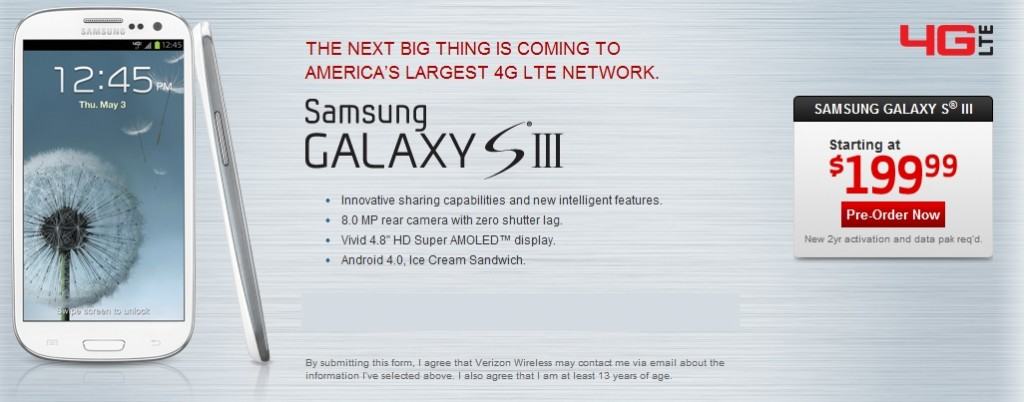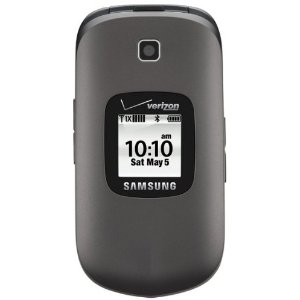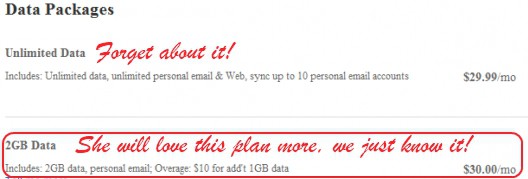
Last minute upgraders are hurrying to pre-order the Samsung Galaxy S3 to buy an additional two years for their unlimited data plans and get one last subsidized phone.
If you are a Verizon Wireless customer, today is the last day to exercise options under Verizon’s existing plans before the company’s new “Share Everything” plan regime takes effect. While some customers will save money on the new plans, at least at first, many others will not. Verizon is not forcing existing customers to change plans tomorrow, but you may find it worthwhile to lock in any unlimited data plan for the next two years, even if your contract is not scheduled to end until later this year. Remember, Verizon may be saving you a few dollars today, but its bean counters know that data is a growth industry, so the more devices you add to your plan, the quicker you will be paying more and more to upgrade your allowance.
Droid Life helps cover some of the basics before we discuss your options:
What are Share Everything plans?
Think of them like the family minute and text plans that you have been a part of for years now, but for data. With a Share Everything plan, you purchase a bucket of data at a flat rate for your whole family to use, just like you did with minutes and texts. You no longer have to buy individual smartphone or feature phone data plans on Share Everything. Deciding which plan will best suit your family is the key here, which requires some analyzing of the amounts of data you are currently using.
How are they priced?
The tiers are as follows: 1GB for $50, 2GB for $60, 4GB for $70, 6GB for $80, 8GB for $90, and 10GB for $100. Along with a data tier, you also have to factor in your “per device” cost which is $40 per smartphone, $30 per feature phone, $20 per Jetpack, and $10 per tablet. Mobile hotspot is included with Share Everything at no extra cost as it pulls from your data bucket. If you would like more than 10GB, you can purchase extra 2GB add-ons for $10 a piece. If you go over your data bucket limit, you are charged $15 per 1GB overage.
Minutes and texting are unlimited on Share Everything plans, so your only worry is data usage.
You can read more about pricing at our step-by-step guide to selecting a plan.
Can I keep unlimited data? Do I have to switch to Share Everything?
Yes, you can keep unlimited data. No, you do not have to switch to Share Everything. We wrote up an entire detailed post on this scenario of keeping unlimited data that I recommend you read.
Should I upgrade now?
Maybe. If you want to enjoy one last discounted (subsidized) price on a phone and keep unlimited data, you have to upgrade before June 28. If you upgrade after at a discounted price, you will have to change your plan to either a single person tier (2GB for $30) or join a Share Everything plan. Further details on upgrading now, including Galaxy S3 pre-orders, can be found at this post.
What if someone on my family plan upgrades after Share Everything is live?
While I have yet to get a definitive answer from any higher-ups at Verizon, it is my general understanding that you can always choose something other than Share Everything as long as you are a current customer before June 28. If you are in a family plan now and one of your lines upgrades after June 28 and chooses Share Everything, it will not affect your line. From what I have gathered over the last few weeks, you would not have to choose to join their shared plan. Also, if you want to upgrade after June 28, you can choose between a Share Everything plan and an individual tiered plan starting at 2GB for $30.
Now it’s time to consider some options:
 1. Do nothing. If you want to keep what you have until your current contract expires, do nothing. Absolutely nothing will change on your account until a contract expires and you seek to upgrade your phone (or you can depart for Sprint, T-Mobile, or some carrier not using this new pricing). If you stay with Verizon, you can continue with a month-to-month plan until you seek to upgrade your phone. At that point, you will either have to pay full price for an unsubsidized phone (can be up to $600 or more) or get a subsidy with a new tw0-year contract on one of Verizon’s new plans. You will lose unlimited data at this point unless you bring an unsubsidized phone to the party. But financially that may not make sense. Verizon charges the same monthly rates, designed to recoup phone subsidies, whether you have a subsidized or unsubsidized phone, so you are paying the phone company back for a discounted phone you never got.
1. Do nothing. If you want to keep what you have until your current contract expires, do nothing. Absolutely nothing will change on your account until a contract expires and you seek to upgrade your phone (or you can depart for Sprint, T-Mobile, or some carrier not using this new pricing). If you stay with Verizon, you can continue with a month-to-month plan until you seek to upgrade your phone. At that point, you will either have to pay full price for an unsubsidized phone (can be up to $600 or more) or get a subsidy with a new tw0-year contract on one of Verizon’s new plans. You will lose unlimited data at this point unless you bring an unsubsidized phone to the party. But financially that may not make sense. Verizon charges the same monthly rates, designed to recoup phone subsidies, whether you have a subsidized or unsubsidized phone, so you are paying the phone company back for a discounted phone you never got.
2. If you are eligible for an upgrade, you may want to use it today! Log into your Verizon Wireless account and check your phone lines for any eligible for immediate upgrades. If one or more are, today is the last day to consider using that upgrade -and- keep your unlimited data plan. Keep in mind you can activate a new phone on any number on your plan (preferably one with unlimited data, of course) and move them around if one of the people on your account can make better use of a new phone than the person eligible for the upgrade. You will commit to a new two-year contract for each line you upgrade and you will pay Verizon’s phone upgrade fee ($30) per phone.

You can buy yourself eligibility for subsidized smartphones by activating a “dummy” extra line with Verizon Wireless for $9.99/month or use it with an older basic Verizon phone without incurring data charges.
3. If you are not eligible for an upgrade, you can still buy at least two more years of grandfathered unlimited data without buying an unsubsidized phone, but you will pay a penalty. Verizon will allow customers not eligible for an upgrade to add additional lines to their account specifically to qualify for new subsidized phones they can use on any number on their account. Let’s say you have two lines active with Verizon not eligible for an upgrade until later this year, but you don’t want to lose your unlimited data -and- you want one last subsidized phone. Simply call Verizon Wireless and ask them to establish two new lines of service on your existing account with a “dummy ESN” registered in their system. You will pay $9.99 per month (plus taxes and fees) on each line with new two-year contracts for each line, but this will qualify you for an immediate subsidized upgrade to any in-stock smartphone. You can also pre-order Samsung’s wildly popular Galaxy S3 ($199 subsidized, $599 unsubsidized).
You will then have two more years of unlimited data on your new phone. If you have older non-smartphones laying around, you can activate them instead of using the “dummy ESN” method and allow someone like a parent or child to share your existing calling plan without running up data charges or text messages (although you can add those options as well if needed).
You should coordinate this over the phone with a Verizon Wireless customer service representative (1-800-922-0204) explaining you don’t currently qualify for an upgrade but want to establish “dummy service” on a new line(s) to win a subsidized phone. Most representatives are familiar with this. But when the new phones arrive, you will want to have Verizon Wireless handle activation themselves because they are equipped to transfer those new phones to replace the existing ones on your account and not lose your unlimited data plan in the process. If you activate them yourself, they will be up and running on different phone numbers and you will have to visit a Verizon store to obtain new 4G SIM cards to switch phones to the correct lines. Let Verizon handle it, and any messes that might occur along the way.
You will not pay any early termination fee for not using your old phones anymore, but you will probably want to call Verizon about dropping contract-expiring lines on your account when their respective contracts expire so you minimize the number of months you are paying an additional $9.99 a month for extra phone lines you probably will not be using. You will neither pay an activation fee or upgrade fee using this method.
Is it an expensive price to pay for an early upgrade? Perhaps, but maybe not if it means buying another two years of unlimited data service.
It is important, however, that you complete any arrangements to order your phone(s) prior to the end of day today. We strongly recommend you work through Verizon Wireless’ own sales department (they shut down for the night at 11pm EDT) to arrange for new phones or pre-orders (which are acceptable to activate later and still keep unlimited data). If you deal with a third party like a non-Verizon store or website, the order may not process in time to qualify within the remaining hours Verizon’s old plans are still active.
By July 2014, we will be back here again trying to maneuver the renewal of unlimited data plans Verizon now hates. But spending time to preserve these plans may be important to your wallet when you consider just a year ago, Verizon charged $30 for unlimited wireless data. Effective tomorrow, they charge $50 for 1GB of data. Where will we be two years from today? The sky is the limit.
 Sally Medina is a Sacramento mom grandfathered with her daughter on an unlimited data plan, or so she thought.
Sally Medina is a Sacramento mom grandfathered with her daughter on an unlimited data plan, or so she thought. “This was the agreement. We did our part. I think they should follow through on theirs,” Medina told CBS Sacramento consumer reporter Kurtis Ming. “They told her it was going to be unlimited so she didn’t question it.”
“This was the agreement. We did our part. I think they should follow through on theirs,” Medina told CBS Sacramento consumer reporter Kurtis Ming. “They told her it was going to be unlimited so she didn’t question it.”

 Subscribe
Subscribe





